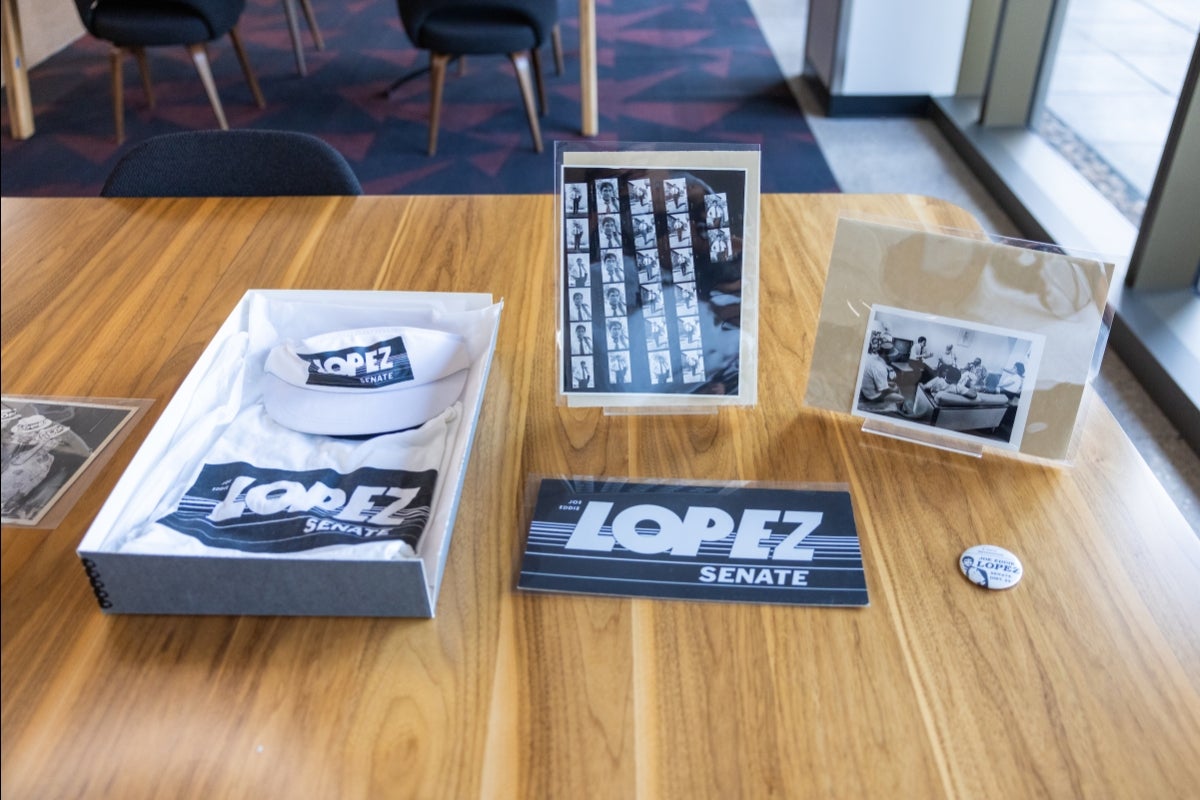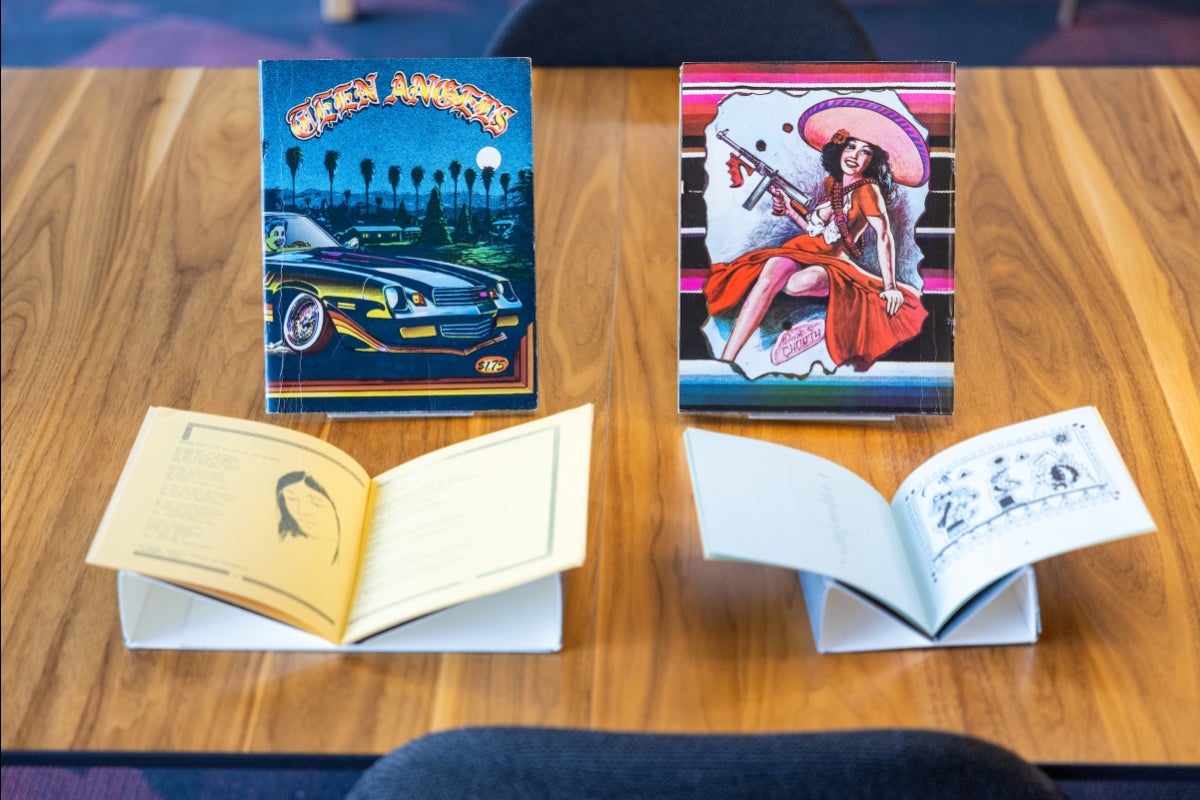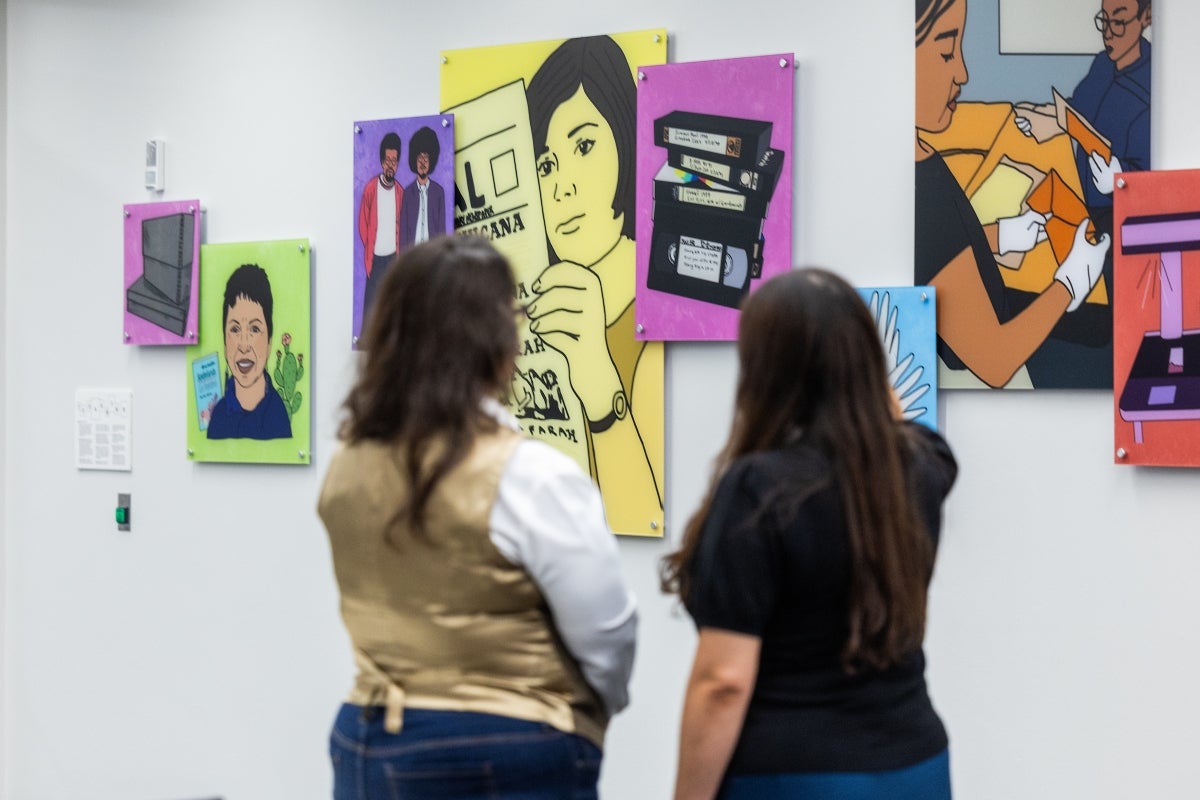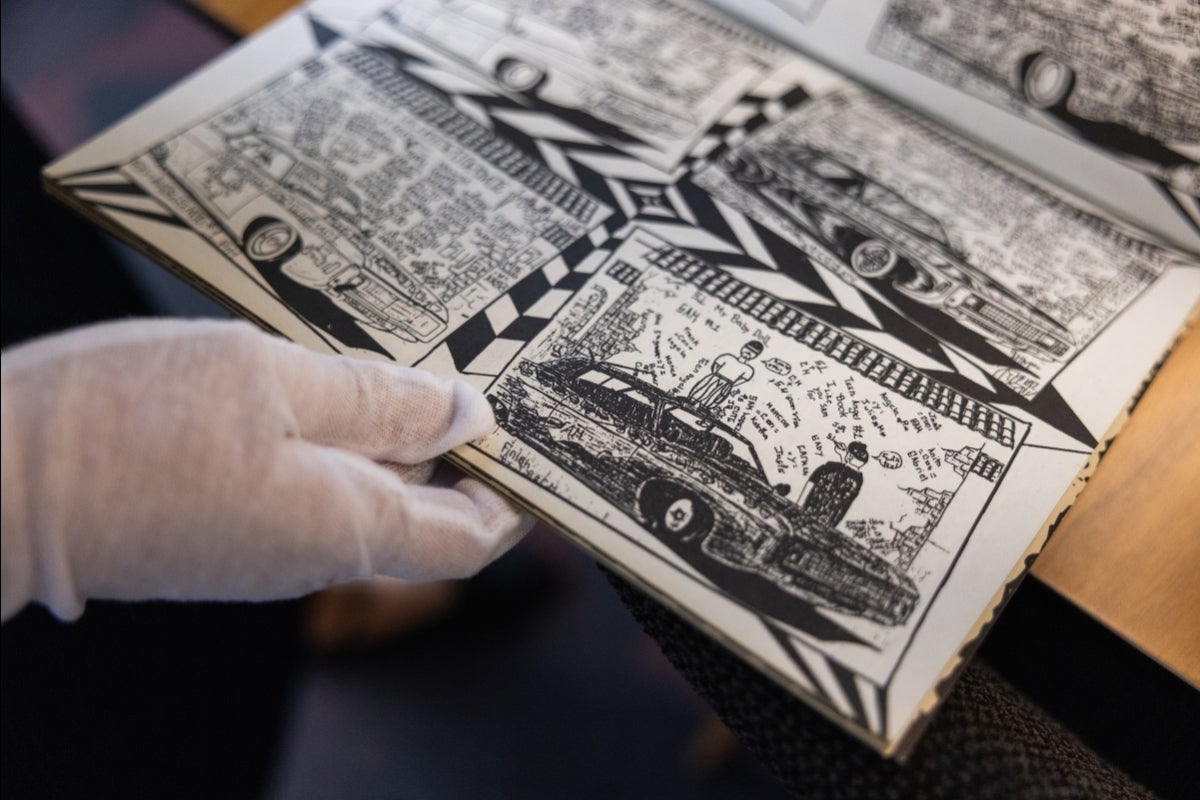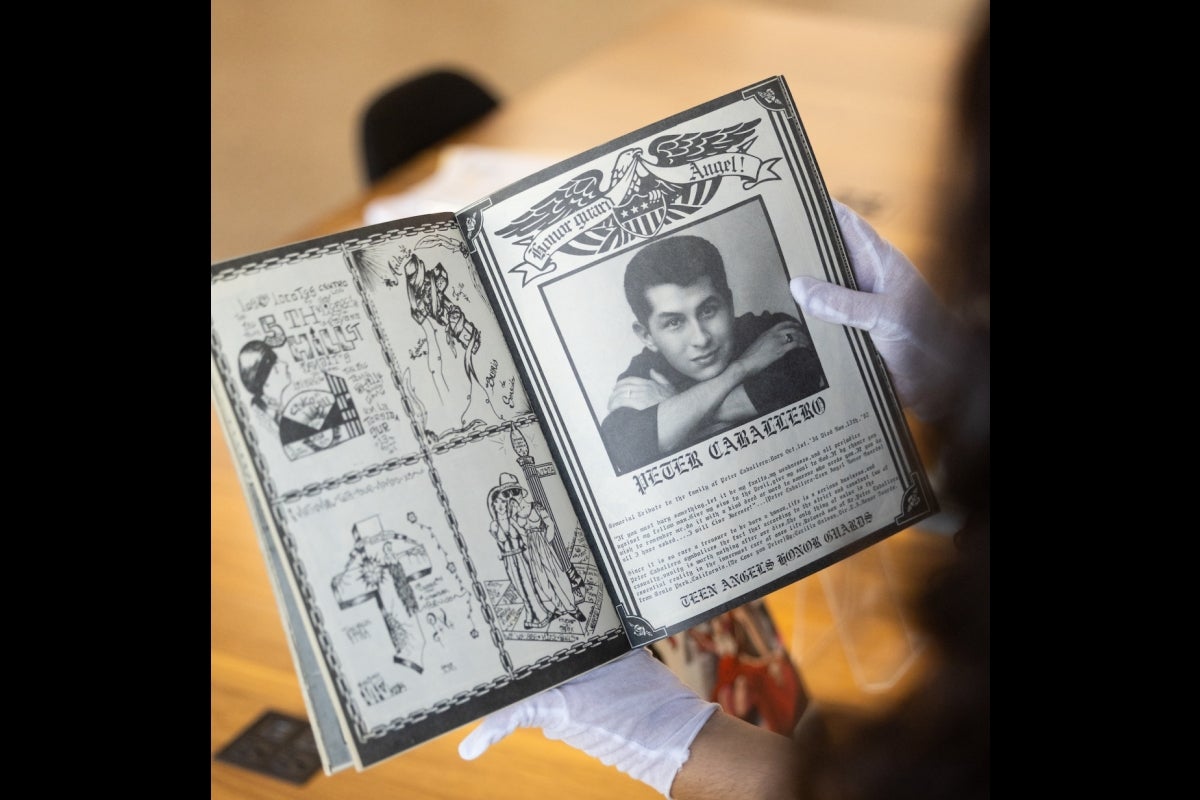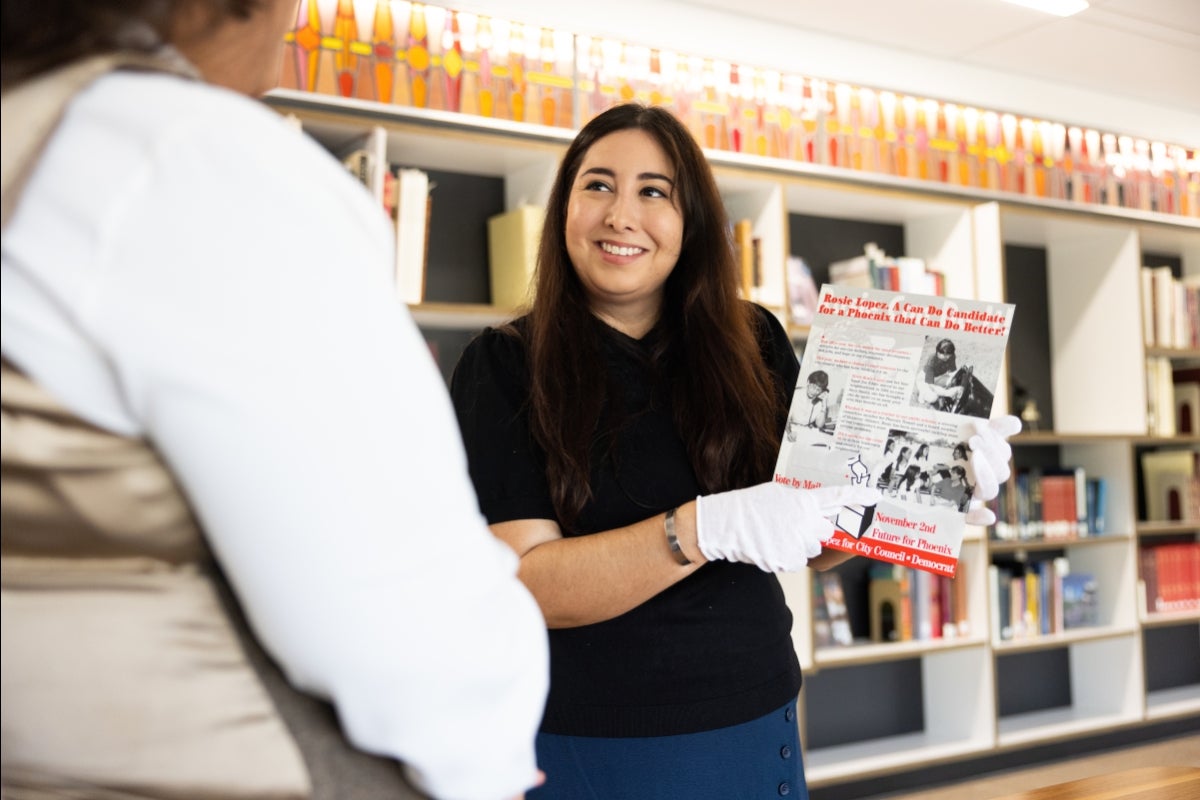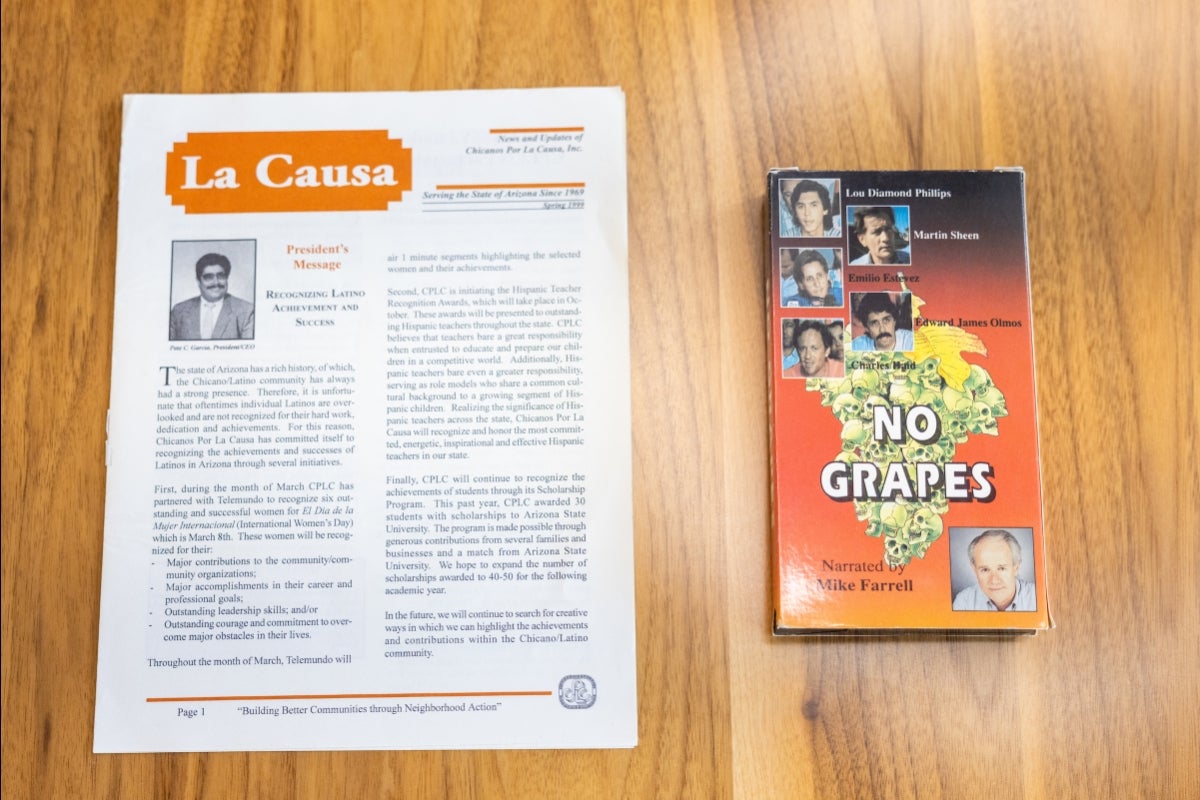ASU archive filled with action, education and activism

Jasmine Torrez (left), assistant archivist for outreach in the Community-Driven Archives Initiative, and Nancy Godoy, director of the Community-Driven Archives Initiative and an associate archivist in ASU Library’s Chicano/a Research Collection, look at items in the Chicano/a Research Collection at ASU Hayden Library on the Tempe campus. Photo by Deanna Dent/ASU
Editor’s note: This is part of a monthly series spotlighting ASU Library’s special collections throughout 2024.
When Christine Marin was a student worker at Arizona State University in 1968, a movement of Latino students sat at the door of ASU President Homer Durham for a few days that fall semester.
The group was quietly protesting for the addition of a research archive to document a culture that was then largely absent from academic discourse.
“These were Mexican American students who started calling themselves Chicanos. They came from mining towns like Clifton, Morenci, Superior, Miami, Globe, Hayden, Bisbee and Winkelman, Arizona,” said Marin, an ASU emeritus professor who founded ASU's Chicano/a Research Collection and archives in 1970. “These brave students demanded a studies collection that reflected the history of Chicanos published in books and bibliographies in other universities.”
More than 50 years later, that collection holds the distinction of being Arizona’s first and largest archival repository of Latino history in the Southwest, and it is cared for with passion and energy by a new generation of Latino archivists. And those archivists are expanding out and reaching new students and communities, inspiring students today to become archivists.
The Chicano/a Research Collection features primary and secondary sources that complement the research needs of the ASU community and the general public. It comprises 127 collections totaling 1,574 linear feet — featuring personal records, diaries, correspondence, photographs, oral histories and genealogy records.
“The beauty of this collection is how it captures the voices and history of multiple generations,” said Nancy Godoy, director of the Community-Driven Archives Initiative and associate archivist of the Chicano/a Research Collection. “As we get ready to celebrate the 55th anniversary of the collection, we acknowledge Dr. Marin’s lifetime of advocacy and take pride in preserving the deep impact of Chicano/a activism in Arizona.”
In celebrationHispanic Heritage Month takes place from Sept. 15–Oct. 15. of National Hispanic Heritage Month, we take a look at the rich variety of materials in the collection that showcase Latino history in Arizona and the Southwest.
Ed Pastor Congressional Papers Project
One of the largest donations of material is from Congressman Ed Pastor, who at one time was Arizona’s senior member of Congress. Over a span of more than 20 years, the congressman and his office donated 300 boxes of materials, with the last box arriving in 2015 before he passed away on Nov. 28, 2018.
Pastor was a guiding star in the field of public service for Arizonans. Growing up in the mining town of Claypool, Arizona, Pastor was the first in his family to graduate from college, using education to change his own life and for the betterment of the community. As a teacher, director of a nonprofit organization and ultimately the first Mexican American congressman to represent the state of Arizona, Pastor left an indelible mark on both the local community and the national political landscape.
These papers house correspondence, reports and budgeting records dating from 1977 to 1992 that Pastor compiled during his time on the Maricopa County Board of Supervisors and as a representative from Arizona in Congress.
ASU Library has teamed with the Pastor Center for Politics and Public Service in the Watts College of Public Service and Community Solutions to finish processing his collection. Those who would like to contribute to this campaign may do so by visiting the ASU Foundation site.
“Donations will support hiring a project archivist who will spend two years organizing his collection and working with our existing team to make it accessible and conduct educational outreach with K–12 schools,” Godoy said. “We want students to learn about this important political figure in Arizona who was the first Latino to be elected as a congressman in Arizona in 1991.”
Other noteworthy collections
While the Ed Pastor Congressional Papers Project is perhaps one of the more high-profile collections in the Chicano/a Research Collection, there are many others worth exploring.
Chicanos Por La Causa houses administrative records, newspaper clippings, architectural drawings, videotapes, photographs and other materials showing the organizations involvement with community issues, economic development and the Mercado Marketplace. ASU Library, in collaboration with Arizona Barrio Stories is workingArizona Barrio Stories is an organization and Facebook group with over 39,000 members dedicated to recording and sharing Chicano/Mexican history. with Chicanos Por La Causa on educational archival workshops throughout the Valley.
Valley Friends of the Farm Workers Photographs is a robust collection of photographs documenting Arizona farmworker history in 1972 and 1984. Photographs document Cesar Chavez's “Fast of Love” in response to Arizona House Bill 2134, farmworker meetings and protests. Others depict farmworker living and working conditions, as well as the Valley Friends of the Farm Workers’ efforts to help this community.
Graciela Gil Olivarez Photographs contains mostly images documenting Graciela Olivarez's life and work between 1951 and 1982. The majority of these photographs depict Olivarez, an attorney and civil rights activist who served in President Jimmy Carter’s administration, attending events, presenting or receiving awards and giving speeches.
The Rose Marie and Joe Eddie Lopez Papers focuses on the married couple’s political activity and work in community service groups, such as Chicanos Por La Causa. Although the collection extends from 1941 to 2000, the bulk of it concerns school board activities between 1969 and 1976.
The Roberto Reveles Papers contains correspondence, photographs, newspaper clippings, organizational records, subject files and other items documenting Reveles' career as a congressional staffer in Washington, D.C., for five congressmen in Arizona and New Jersey, between 1956 and 1980. His work as an advocate for civil rights and immigration reform in the Mexican and Mexican American communities is also shown.
Reveles, a veteran, civil rights leader and gold mine executive, said the Chicano/a Research Collection was the only logical place where he could properly preserve his civil rights work and legacy.
“The Chicano/a Research Collection is a very important collection and houses papers from very significant personalities from Arizona,” said Reveles, who was born in Miami, Arizona, of Mexican immigrant parents. “I feel very good that I didn’t destroy or otherwise ignore the collection that I had accumulated over the years. It’s now in very good hands.”
Next-generation archivists
More than just serving as research, the Chicano/a Research Collection allows community members to see themselves in history — probably for the first time, Godoy said.
“There is a sense of belonging and roots when students view our collections and reflect on their own personal journey," she said.
The archive is a hub for continued cultural recognition and engagement. It’s leveraging greater activity through ASU Library’s Community-Driven Archives Initiative, which addresses societal inequities, erasure and trauma. This is evident with the current implementation of services and programs, including a new memory lab.
From archives toolkits to hosting local events and collaborating with BIPOCBlack, Indigenous and people of color and LGBTQ community partners, the initiative’s work continues to empower marginalized communities by creating safe spaces of learning and engagement.
One way they do this is through engagement with underserved and underrepresented communities. According to a 2022 survey conducted by the Society of American Archivists, the profession is currently 84% white and 5.2% Latino. With grant support from the Institute of Museum and Library Services, the Community-Driven Archives Initiative and the ASU Labriola Center established the Community Archivist Fellowship program in 2022 to encourage BIPOC community college students to work with archives.
Before transferring to ASU, student Esme McHarg worked on the Chicano/a Research Collection last semester through the Community Archivist Fellowship while at Paradise Valley Community College. McHarg said her focus on materials about the Valley of the Sun YMCA in the Lopez Papers was helpful in her understanding of how others make big sacrifices on behalf of their communities.
“I viewed a lot of documents, flyers and different programs and activities for Hispanic kids to stay active in sports like basketball, soccer and swimming,” McHarg said, who is an animation major in ASU’s Herberger Institute for Design and the Arts. “The collection has inspired me to use my art to help other people. It gave me hope that I can also do something for others.”
Kenia Menchaca Lozano is one of three Latino archivists at ASU. She helped process the Rose Marie and Joe Eddie Lopez Papers, and she said the collection personally spoke to her.
“I was struck by their work to combat English-only legislation in Arizona. As an immigrant, bilingual education was very important to our family,” said Menchaca Lozano, an archives specialist with the Community-Driven Archives Initiative and a former Knowledge River scholar, a master’s program for Latino and BIPOC students seeking to enter the library profession. “Spanish was our first language when we arrived in the United States in 1997, making it difficult for us to navigate the country. Learning English in school made a big difference for our family because it gave us the linguistic and cultural capital to transition from Durango, Mexico.
“Processing their collection, as a beneficiary of their hard work, is a monumental achievement for me. It allows me to return the favor by ensuring their legacy lives on within the archives.”
Jasmine Torrez is an assistant archivist specializing in outreach for ASU Library and a graduate of the Knowledge River program.
“A big part of my job is to make sure we are prioritizing and embedding CDA (Community-Driven Archives) and the resources and archives we have into our teaching,” said Torrez, who conducts Community-Driven Archives escuelita (“little school") workshops for the community and in Valley classrooms.
"I especially enjoy doing archival work with kids and letting them know their knowledge and stories are important. They feel seen and empowered when they learn they can be storytellers," Torrez said.
Recently, Torrez created a Community-Driven Archives lotería board gameLotería is a traditional Mexican board game of chance, similar to bingo, and is played on a deck of cards. as an innovative way to implement archival education and local history into schools.
Even beyond the ASU community, the impact of the collection and Community-Driven Archives is felt in other states.
Yesenia Ramos, also a Knowledge River scholar and Community-Driven Archives research intern from 2022 to 2024, worked alongside Menchaca Lozano in processing the Lopez collection and Torrez with the class visits for the escuelita. This allowed her to gain experience in navigating how to convey archiving information to young children.
“I am ecstatic that working with CDA allowed me to be creative in the ways we can share knowledge with kids that is both engaging and accurate for archives and history that do not need to be highbrow or inaccessible,” Ramos said. “Going to school visits and hearing the stories from third graders about their lived experience and showing them tools to share and preserve their own stories was rewarding because they matter and not just bigger historical stances.”
Since graduating, Ramos brought her experience to her new venture. Now a bilingual children’s librarian at the Multnomah County Library System in Oregon, Ramos works with the Spanish-speaking community in Portland and surrounding cities to provide services to the community.
Inspired by ASU’s recent recognition as a Hispanic Serving Institution, the Community-Driven Archives Initiative is working to improve the educational pathway for Latino students by creating a space that reimagines memory keeping and learning environments.
“With this next generation of community archivists and students, we can further diversify the Chicano/a Research Collection. We want to hear from younger folks on what is important to them so we can preserve the legacy of the future,” Godoy said.
Monthly series spotlighting ASU Library’s special collections
- January: Expanded Theatre for Youth and Community Collection remains a repository for emerging artists and educators
- February: Black Collections aims to document the lives of an underrepresented Arizona community
- March: Voices from Latin America can be found in dynamic research collection
- April: Thunderbird archives: These walls do talk
- May: Collection preserves legacy of modern architects, buildings in the Southwest
- June: LGBTQ+ Studies Collection a repository rich in legacy
- July: Pop-up book collection is deceptively simple fun
- August: A (re)source of Sun Devil pride
- September: Chicano/a Research Collection filled with action, education and activism
- October: ASU collections offer Indigenous perspective through traditional storytelling, innovative methodology
- November: University Archives chronicles more than 140 years of Sun Devil history
- December: Collection captures the robust history of Arizona
More Arts, humanities and education

Award-winning playwright shares her scriptwriting process with ASU students
Actions speak louder than words. That’s why award-winning playwright Y York is workshopping her latest play, "Becoming Awesome," with actors at Arizona State University this week. “I want…

Exceeding great expectations in downtown Mesa
Anyone visiting downtown Mesa over the past couple of years has a lot to rave about: The bevy of restaurants, unique local shops, entertainment venues and inviting spaces that beg for attention from…

Upcoming exhibition brings experimental art and more to the West Valley campus
Ask Tra Bouscaren how he got into art and his answer is simple.“Art saved my life when I was 19,” he says. “I was in a dark place and art showed me the way out.”Bouscaren is an …


